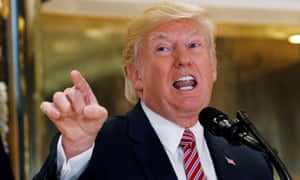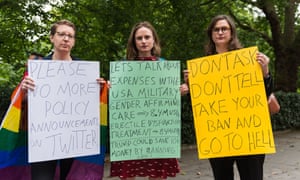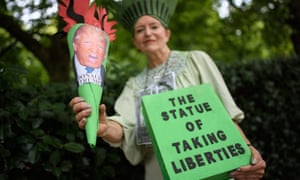It is difficult for Americans to watch the presidential parody that is Donald Trump
with anything approaching equanimity. But it is also hard for
non-Americans – long-time friends and admirers of the United States –
who look on helplessly from afar.
Reactions range from amazement and amusement to shock and dismay. How has this frightening travesty come about? What does it mean for the America we love? And what does it portend for a world accustomed to sensible, reliable, rational American leadership?
Every country has its political mavericks and clowns. But to put a shadow figure like Trump, a profoundly ignorant, self-obsessed narcissist lacking any discernible moral compass, in charge of the nation’s affairs looks like an act of collective madness.
Seven months after he took office, the situation has not “normalised”. On the contrary, it grows more abnormal by the day. Just look at Trump’s aberrant press conference performance on Tuesday when, breaking his word of the previous day, he deliberately re-opened America’s most sensitive wound – racial division – and picked at the Charlottesville scabs until the blood gushed anew.
This reckless divisiveness, this shameless moral ambiguity, this historical know-nothingness, this thinly-disguised bigotry – these are not the qualities one expects of an American president. This is not leadership. This is not change. This is not greatness renewed.
This unworthy man, and the far-right ghouls who cling to him, set a
dreadful example for the rest of the world, from the very country that
is deemed by many to be the ultimate symbol of justice, liberty and
democratic governance.
The US is better than this.

Reactions range from amazement and amusement to shock and dismay. How has this frightening travesty come about? What does it mean for the America we love? And what does it portend for a world accustomed to sensible, reliable, rational American leadership?
Every country has its political mavericks and clowns. But to put a shadow figure like Trump, a profoundly ignorant, self-obsessed narcissist lacking any discernible moral compass, in charge of the nation’s affairs looks like an act of collective madness.
Seven months after he took office, the situation has not “normalised”. On the contrary, it grows more abnormal by the day. Just look at Trump’s aberrant press conference performance on Tuesday when, breaking his word of the previous day, he deliberately re-opened America’s most sensitive wound – racial division – and picked at the Charlottesville scabs until the blood gushed anew.
This reckless divisiveness, this shameless moral ambiguity, this historical know-nothingness, this thinly-disguised bigotry – these are not the qualities one expects of an American president. This is not leadership. This is not change. This is not greatness renewed.
The US is better than this.

It was a warm, sunny morning in Washington DC in the spring of 1992 when I finally took America to my heart. On the South Lawn of the White House, the then US president, George HW Bush, was busy extolling the virtues of American fitness.
Not American fitness to rule, or fitness to serve, or American fitness to lead the world. Bush, with his wife Barbara at his side, was talking about the need to improve and safeguard the physical and mental health of every American citizen.
To help make his point, Bush had invited Arnold Schwarzenegger, the future California governor, former Terminator and chairman of the President’s Fitness Council, to perform some exemplary press-ups. It was the launch of what he dubbed the “Great American Workout”.
Fitness must be a part of each American’s day, he declared. “We need balanced and nutritional diet. And we’ve got to avoid tobacco and drug use, avoid excessive alcohol use. And fitness really can enrich the human mind and body by lowering stress and blood pressure and cholesterol.”
For a watching English reporter, deeply imbued with the cynicism of political life, Bush’s paternalistic behaviour seemed extraordinary – and revelatory. Here was the president of the United States, the most powerful man on the planet, fretting about the bodily habits of his fellow citizens.
And he really seemed to care.
It was impossible to imagine a British prime minister, never mind the Queen, behaving in similarly plebeian fashion (this was the pre-Blair era). Such a display would be deemed embarrassing, foolish, undignified.
But Bush’s perspiring audience lapped it up. What other country, I thought, and what other national leader would carry on in this unpretentious way? It was entirely charming, and I was charmed.
Yet Bush’s actions were instructive in other, more presidentially symbolic ways. They spoke to his sense of a free people joined together in a voluntary, mutually supportive union. For him, “one nation under God, indivisible, with liberty and justice for all”, to quote the Pledge of Allegiance, was no trite slogan. It was a living, vital principle.
It was a vision of leadership from a man who once admitted he struggled with the “vision thing”. And it came from the same, heartfelt place that produced, in his speech to the Republican convention in 1988, Bush’s famous plea for the free peoples of the American Republic to show compassion, tolerance and “reliable love” for each other.
“Some would say it’s soft and insufficiently tough to care about these things. But where is it written that we must act as if we do not care, as if we are not moved? Well I am moved. I want a kinder, and gentler nation.”
What has happened, 25 years after that sunlit day on the South Lawn, to the America I came to love? Where did the kinder, gentler vision go?
Nobody is pretending for a moment that the Bush Sr era was some ideal, halcyon age. The de-industrialisation of the midwest was already well advanced. Economic dislocation, lost jobs, globalisation, international competition and disorientating, unsettling social and cultural shifts were part of the daily conversation.
Bush was forced to cut cut short his South Lawn exercises that day to deal with rioting in Los Angeles following the Rodney King beating trial verdict. Racial prejudice was a destructively pervasive issue then, too, as the Anita Hill and Judge Clarence Thomas controversies demonstrated.
All the same, the contrast with today is striking. The many disruptive, alarming and increasingly deplorable changes in America’s attitude, both to the world and to itself, that are now a daily feature of the Trump era seem to represent a fundamental shift away from what went before.
Did something break along the way? Did the dream die? America’s friends would dearly like to know.

The compassionate, caring nation of Bush’s imagining, the “shining city on a hill” lauded by Ronald Reagan, the land of equality, freedom and opportunity that Abraham Lincoln fought for, Franklin Roosevelt worked for, and JFK died for: where is it now? Has it had its day?
Alexis de Tocqueville, that famous student of American democracy, once wrote: “America is great because she is good. If America ceases to be good, America will cease to be great.”
Under Trump, for whom goodness, truth and generosity of heart appear wholly alien concepts, American greatness is under existential threat. Channelling its president, the country that Lincoln described in 1862 as “the last best hope of earth” risks becoming the narcissist nation – the earth’s selfish, self-obsessed nemesis, and its very own worst enemy.
As every traveller knows, examining one’s own country through the eyes of others, looking in from the outside, is an instructive if not always comfortable experience.
Assuming the foreign observer is neither unreasonably enamoured nor hostile, the diagnostic picture that emerges can change the way citizens regard themselves and their nation.
The current American picture is un-nerving.
Take the White House, that most visible, global symbol of American power. Since taking office in January, Trump has turned the Oval Office into a propaganda unit promulgating arbitrary executive orders, inflammatory statements and dangerous, uninformed policy reversals.
The White House briefing room, a vital source of factual information on US domestic and foreign policy, became a theatre of the absurd. White House staff, seen as vital in assisting and guiding a greenhorn president, turned out, in many instances, to be more amateurish than their boss. Many have been fired. Many more should be.
And Trump himself purposefully devalued the White House as the nerve centre of American government, preferring to tap out ill-considered Tweets from his luxury properties in New York, New Jersey and Florida. Trump recently called the White House “a dump”.
For outsiders, these changes are bewildering. But other Trump moves are seen as more seriously disruptive, introducing unwelcome elements of unpredictability and arbitrariness.
His disdain for the normal processes of government extends to a hollowed-out State Department, now facing punitive staffing cuts and a loss of influence; to the Pentagon and the intelligence community, whose judgments and actions he openly disputes, as on Russia and Afghanistan; and to the Justice Department and FBI, whose leaders he has abused and willfully obstructed.
Trump’s unceasing conflict with sections of the American media raise real questions about his understanding and commitment to constitutional guarantees of a free press – or at least that’s how it appears.
And the support his attacks receive from partial, rightwing outlets such as Fox News and Breitbart, plus official attempts to target anti-Trump websites and activists, pose further disturbing questions about adherence to basic legal rights in a country that made human rights a key pillar of its global policy.
Yet the refusal of many in the Republican party to stand up to Trump, and the overall failure of Congress, so far at least, to present a united front on the most contentious issues has also been truly shocking.
Ruling party sycophancy and oppositional weakness around an authoritarian leader is to be expected in immature or struggling democracies. Malaysia, Rwanda, Egypt and South Africa come to mind. But the US is not Venezuela. Or are similarities growing?
Things may be slowly changing. Republican criticism of Trump over Charlottesville, including from Bush Sr, has been scathing. But the world now waits to see if the most egregious charge levelled against the president and his advisers – that they connived with a foreign power, namely Russia, to fix last year’s election – will be thoroughly investigated.
All in all, America’s famed governance system of checks and balances, long touted as a model for others, is being tested in front of a global audience as never before. And not since the Civil War has there been such widespread doubt about its resilience.
Viewed from Europe, Africa or Asia, Trump’s overall policy approach to international issues seems to be: take a bad situation and make it worse. Ignorance, intemperance, ego and braggadocio are the policy’s main features. Confusion and dangerous confrontation are its principal results.
Trump has managed, in a few short months, to raise tensions on the Korean peninsula to the point of all-out war. In what is becoming a familiar pattern for watching governments, he has ignored the advice of allies, defied foes, ramped up the rhetoric, issued dire threats of military action – but failed to come up with a plan.
Trump’s approach, vacuous and dangerous in equal measure, has been particularly unhelpful in Israel-Palestine. Trump promised to achieve the historic peace deal that has eluded all his predecessors. He massively raised expectations, and boasted prematurely of his success.

But there was no strategy and no new ideas. He put his son-in-law in charge, a man with no experience of diplomacy or peacemaking. He all but ignored one side of the problem: the Palestinians. He stoked up regional tensions by encouraging Israel and Saudi Arabia in their enmity towards Iran. Then he walked away.
Trump’s hostile attitude to Tehran, the loose talk of regime change, and his apparent determination to scrap the landmark 2015 nuclear deal are deeply worrying for America’s European allies. His attitude seems wilfully destructive of years of effort to build bridges with Iran, and not based on any sound evidence of Iranian bad faith.
Yet while threatening military conflict in Korea and the Gulf , Trump does the opposite in Afghanistan. After more than 15 years of costly, joint Nato efforts to defeat the Taliban, Trump’s failure to enunciate a strategy is now bordering on criminal neglect.
He has blocked his own commander’s request for reinforcements. And he looks the other way as the Afghan government falters under accelerating Isis and Taliban assaults. Dropping one, extra-large bomb is no answer.
Nowhere is this betrayal more galling for than in Trump’s incomprehensible infatuation with Vladimir Putin, Russia’s malevolent president, whose depredations in Ukraine, eastern Europe, the Balkans, Syria and in terms of deniable cyber attacks are systematically threatening European security.
Putin must just love Trump. The president’s irresponsible repudiation of the Paris climate accord had epic consequences. It achieved something America’s enemies have only hitherto dreamt of: uniting the entire world against the US. He pulled off a similar trick at the recent G7 summit.
Thanks to Trump, America’s worldwide authority is shot, or nearly so. And the longer Trump rampages unchecked, the worse the damage gets. Opinion polls show confidence in American leadership to be at a low point all around the world.
Trump’s cosy-ing up to autocrats such as Turkey’s Tayyip Erdogan, his patronising, borderline misogynistic attitude to Europe’s de facto leader, Germany’s Angela Merkel, and Britain’s Theresa May, and his narrow-minded ignorance of other peoples and countries is embarrassing and humiliating, not least for his fellow Americans.
It makes America small again.
The yawning gulf between the America of Bush Sr, when fitness for office, duty and responsibility were hallowed imperatives, and the era of uncaring, feckless, divisive narcissism personified by Donald Trump is most visible not in domestic or foreign policy, but in questions of values, race and morality.
Americans will have their own point of view. But this is how it looks to a long-time foreign observer who has lived and breathed America for much of his adult life – and who briefly met Trump long ago on the Jersey shore when he opened his Taj Mahal casino.
Trump just simply does not seem to grasp the importance of the time-honoured American values he, as president, is sworn to uphold. He shows scant regard or understanding of the Constitution and the separation of powers.
His respect for the rights of those opposed to him is all but non-existent. He rails crudely against independent voices. And his relationship with the truth is sketchy at best, as shown by the frequent occasions on which he and his spokespeople been caught telling downright lies.
While Trump is a coward by nature and a bully by instinct, he is also a closet racist and bigot. At no time has this been more evident than in his indefensible response to last weekend’s violence in Charlottesville.
Trump’s belated denunciation of far-right neo-Nazi and Ku Klux Klan agitators did not begin to hide his true feelings: that the white supremacists behind the violence legitimately belong to the wider, respectable white American political base that put him in the White House.
It was as though Trump were saying: “These guys might be neo-Nazis. These guys might even be wrong. But these guys are my guys and I get where they’re coming from. So I give them the benefit of the doubt.”
His cynical repudiation on Tuesday of his previous statement condemning the racists was a low-point, even for Trump. There is a clear pattern of racism and immorality here, demeaning to the American presidency and definitive proof, if it were needed, of Trump’s singular unsuitability for the highest office.
Trump has attacked all Muslims, seeking at one point a universal ban on their entry into the US. He has attacked Mexicans and other Hispanics, employing gross generalisations about rapists and criminals.

The statue of Confederate General Robert E. Lee stands behind a crowd of hundreds of white nationalists in Charlottesville. Photograph: Chip Somodevilla/Getty Images
As a private citizen in New York, Trump discriminated against African Americans in housing rentals, campaigned for the death penalty in the notorious Central Park jogger case, and repeatedly abused Barack Obama on racial grounds, suggesting he was not a true-born American.
As president, Trump has surrounded himself with far-right advisers such as Steve Bannon – now removed from his role after a chaotic tenure at the White House – Sebastian Gorka and Stephen Miller, whose views seem to differ little from those of the Charlottesville neo-Nazis.
During last year’s campaign Trump failed repeatedly to convincingly distance himself from supporters whose idea of democracy was to parade about, shouting “Hail Trump!” On the institutional discrimination suffered, for example, by blacks and Hispanics in America’s justice and penal systems, he has nothing whatever to say.
And if you doubt the impact of such gross derelictions of duty, take a look at figures produced by the Council on American-Islamic Relations. It reports that, nationally, “the number of hate crimes in the first half of 2017 spiked 91% compared to the same period in 2016” (which was itself a record-breaking year).
Seen from Britain, Trump is exploiting the same bitter brew of racial prejudice, populism, ultra-nationalism, economic resentment and sheer bloody ignorance that helped produce the vote for Brexit and the recent surge in support for far-right parties in France and elsewhere.
This should be no surprise. This is how narcissism works, by sucking in others and making them think and act as badly as you do yourself.
Patriotism, flag-waving and love of country are all very well in their place. So, too, are policies designed to advance economic justice in disadvantaged places, such as parts of Ohio and Michigan or the north-east of England.
But the anger and resentment of the middle class, of blue collar workers and trade unionists whose livelihoods are disappearing, was already in evidence 25 years ago when I trod the ravaged streets of downtown Detroit.
So, too, was white America’s bottomless sense of entitlement – deeply puzzling in a country reared on ideas of rugged individualism, the frontier spirit of self-help, and manifest destiny.
That same anger was there in Chicago in 1988 when Mike Dukakis, the Democrats’ presidential hopeful, walked the Irish neighbourhoods and men came out of bars to throw bananas at Jesse Jackson (I watched them do it). It was there when self-styled insurgents Pat Buchanan and Ross Perot tapped it in subsequent presidential campaigns – and during the Obama years, although less often heard.
Here’s what changed in the age of Trump: when such angry sentiments are whipped up and magnified for unscrupulous personal advantage, when a political leader encourages ordinary people to blame other groups, races or nations for their problems, when fear and blame become the twin forks of a wicked grab for power, and when the resulting fury tips over into hatred, division, Charlottesville-style violence and “America First” xenophobia, you know you are in big trouble.
Alarm bells should begin to ring.
Just ask any European, where memories stretch back to the rise of fascism in the 1930s. Just ask anybody who ever confronted a skulking bully with a big stick.
Are alarm bells ringing loudly enough across Trump’s America? Perhaps, after Charlottesville, they will. In the final analysis, Trump is just one man. But his actions, and non-actions, as president are hugely symbolic and exert massive negative influence.
They feed on and actively encourage the disempowering sickness of resentment and entitlement that seems to infect much of white America. They frighten everybody else. And they threaten the world with the contagion of separation, division and paranoia.
If fitness, primarily moral fitness, is the ultimate test, as Bush Sr believed, then Trump has proven himself to be fundamentally unfit to lead. Lacking any sense of the greater good, as de Tocqueville defined it, Trump’s way is not the way to make America great again. On the contrary, it diminishes us all.
Simon Tisdall has reported on the US for the Guardian and Observer since 1988. He was the Guardian’s White House correspondent and US Editor based in Washington DC from 1989-1994.

No comments:
Post a Comment